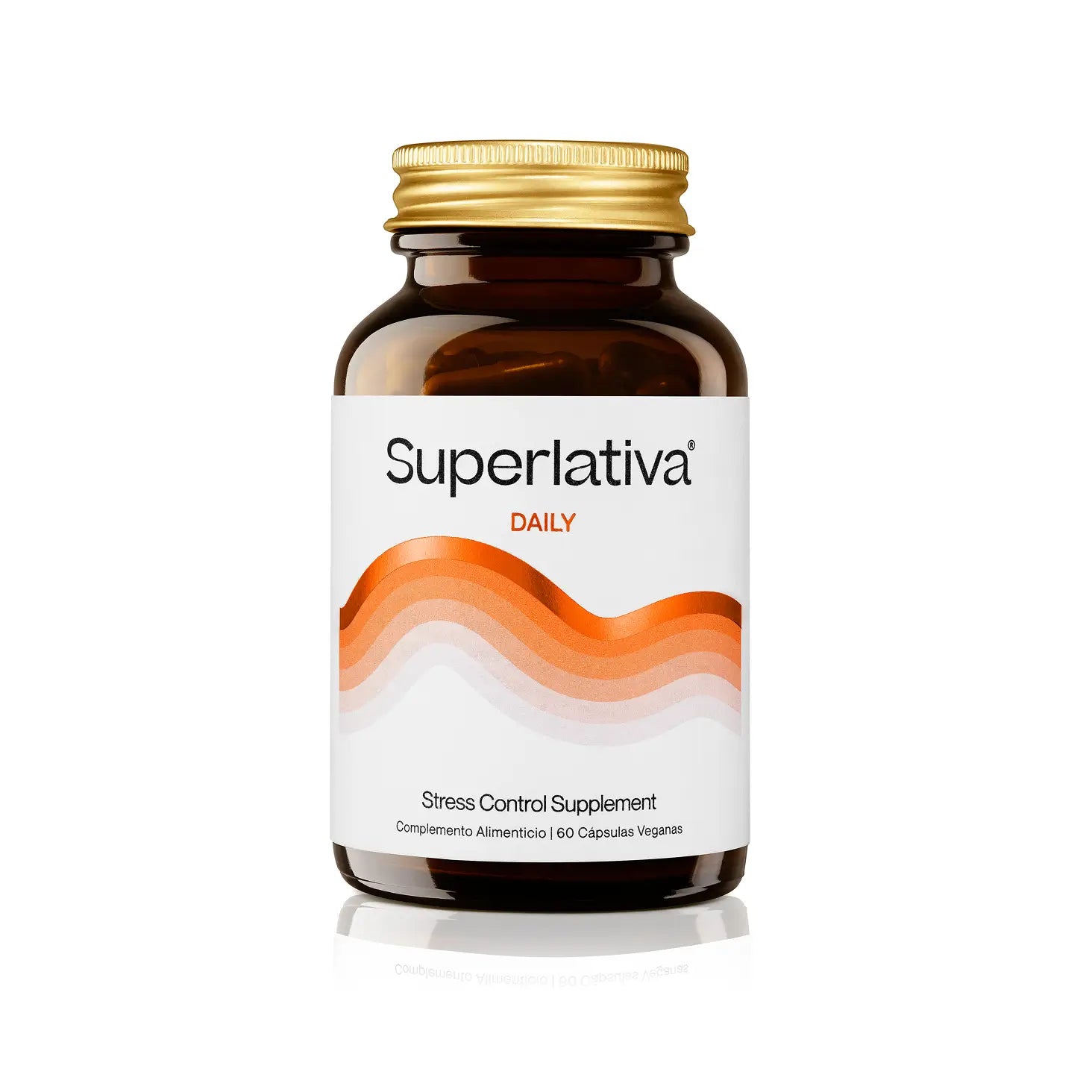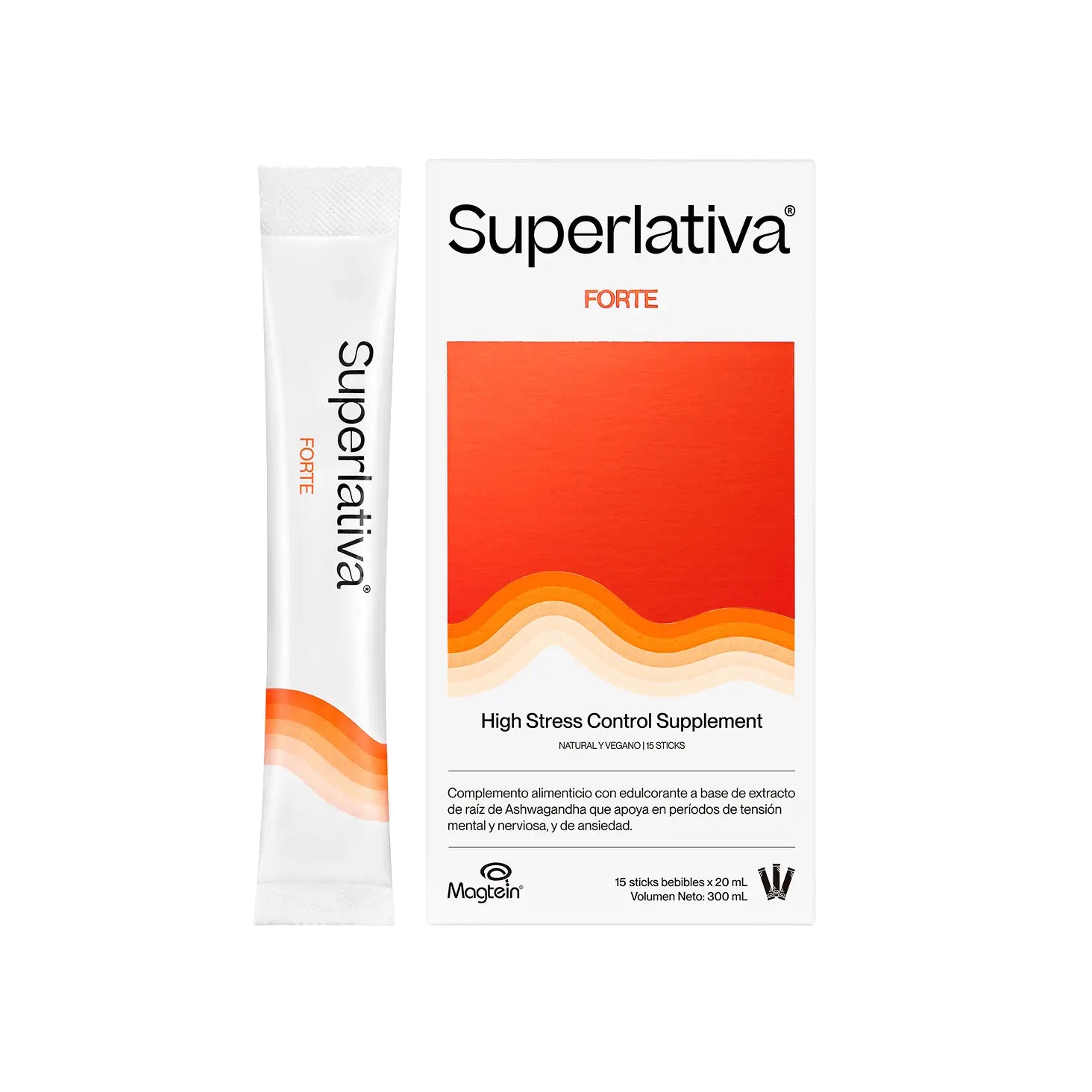By Laura Llacuna, Ph.D., Medical Advisor at Superlative
At some point, we've all experienced stress or anxiety. Sometimes these reactions are normal and adaptive; other times, they become persistent states that disrupt our physical and mental well-being. What begins as a feeling of overwhelm or tension can escalate to affect digestion, sleep, skin, or even breathing, without us knowing exactly why.
What is stress: symptoms and functions
Stress is a feeling of physical or emotional tension that can be triggered by any situation or thought that causes anger, frustration, or nervousness.
In small doses, stress can be helpful: it helps you react to danger or concentrate to meet a deadline. However, when it persists over time, it can seriously affect your health and manifest itself in various symptoms of discomfort, such as bouts of anxiety or a general feeling of discomfort, without you really knowing what's happening to you.
Feeling overwhelmed, helpless, chest tightness, nausea, difficulty breathing, sweating, constant need to urinate, dry mouth, headache, blurred vision, or extreme fatigue are some of the main symptoms.
What is anxiety? Key differences from stress
Although they are often used interchangeably, stress and anxiety are distinct phenomena. They share certain similarities in symptoms, which can lead to confusion when identifying and treating them. Because they are not clearly distinguished, it is common to try to treat them in the same way, which proves ineffective due to their differences.
Stress generally arises in situations in which we perceive that we lack the necessary resources to cope. Faced with this perception of threat, the body reacts by mobilizing all its energy to confront it.
Anxiety , on the other hand, is a physiological response of the brain to a threat, which activates survival mechanisms such as fight or flight. In addition to physical symptoms, it also manifests itself through behavioral reactions, such as freezing or avoiding situations. Its symptoms vary from person to person, and their intensity can range from mild discomfort to debilitating episodes.
A key difference is that stress typically disappears when the stressor ceases, while anxiety can persist even when the trigger is no longer present. In many cases, it appears without a clear external threat, indicating that its origin has more to do with internal factors: the way we manage our emotions and mental processes.
Keys to differentiate them
-
Origin :
-
Stress is usually reactive (to a specific situation).
-
Anxiety can be anticipatory or persistent, even for no apparent reason.
-
Duration :
-
Stress tends to be temporary.
-
Anxiety can become chronic.
A specific symptom that differentiates stress from anxiety is that anxiety generates a constant feeling of worry and fear in situations that are often not threatening.
Multifactorial causes of anxiety
Current research indicates that there is no single cause, but rather a set of interacting variables that increase an individual's vulnerability to developing an anxiety disorder. These are some of the most common:
-
Genetics: There's a hereditary predisposition. If you have close relatives who have suffered from anxiety, you're more likely to experience it too. Some phobias and anxiety response patterns can be passed on genetically.
-
Brain chemistry: The levels of certain chemicals in the brain can affect mood and anxiety levels.
-
Environment and life experiences: Factors such as exposure to traumatic events, emotional or physical abuse, the loss of a loved one, a difficult childhood, or highly stressful work environments can significantly contribute to the development of anxiety.
How is it diagnosed?
Anxiety can be difficult to diagnose, in part because it doesn't always present obvious signs during a medical appointment. Symptoms such as chest tightness or a knot in the stomach can't be directly perceived, and patients often don't know how to accurately describe what's happening to them. Furthermore, certain levels of anxiety can be considered normal in everyday life, which complicates early detection.
Therefore, the first step is usually a clinical interview in which the healthcare professional will ask about the symptoms, their intensity, duration, and the contexts in which they manifest.
It's natural to feel uncomfortable discussing these topics, but it's essential to do so honestly. A clear and honest description of what you're experiencing is key to obtaining an accurate diagnosis and receiving the most appropriate treatment.
Available treatments
We can prevent, modulate, and treat stress and anxiety , helping you regain balance naturally and sustainably. Incorporating healthy habits and holistic strategies is key to restoring physical, emotional, and mental well-being. Below are some of the most effective:
Daily habits that help
-
Sunlight during the day: Natural light in the morning activates the circadian rhythm. The pineal gland needs light to produce melatonin in the evening, the hormone that allows us to sleep. Expose yourself to the sun for 5–10 minutes at the beginning of the day, without sunscreen, avoiding the middle of the day. Prioritize having light on your face and hands.
-
Avoid screens at night: During the dark, we need to avoid stimuli that activate the nervous system. The white light from cell phones or televisions stimulates the release of cortisol and interferes with melatonin production. Avoid screens after 9 p.m., especially cell phones in dark rooms.
-
Healthy eating and protein intake at breakfast: Melatonin is produced from serotonin, and serotonin requires tryptophan, an amino acid found in proteins (meat, fish, eggs, legumes). Eat protein in the morning, when your immune system is calm and not competing for that tryptophan. A protein-rich breakfast (egg, tuna, ham, etc.) promotes the production of serotonin and melatonin. If you're fasting, eat it at night rather than in the morning.
-
Relaxation techniques: Practices such as deep breathing, meditation, or yoga help reduce activation of the sympathetic nervous system and promote a state of calm.
-
Regular physical exercise: It's one of the most effective stress relievers. It releases tension, improves mood, reduces mild anxiety, and improves sleep. Any consistent physical activity (walking, running, dancing) can help you feel more in control of your body and your life.
-
Contact with nature: Contact with nature reduces cortisol levels and brings calm. Being surrounded by trees, walking on the beach, or strolling through a park regulates our nervous system. Go barefoot, hug a tree, breathe deeply. Your nervous system will notice.
Adaptogens and natural regulation
Adaptogenic plants, such as Ashwagandha, Rhodiola, or Schisandra, regulate the hypothalamic-pituitary-adrenal axis, which is responsible for our response to stress.
-
Ashwagandha: It is one of the most studied and widely used adaptogens for reducing stress, anxiety, and depression. Its benefits include reducing physical and mental fatigue, supporting the immune system, increasing energy, and improving mood and overall sense of well-being.
Taking an Ashwagandha supplement like Superlativa Daily—formulated with standardized extracts to ensure quality, concentration, and efficacy—is an easy and effective way to regulate cortisol levels and start feeling better.
Psychotherapy
-
Cognitive-behavioral therapy (CBT): This is the most successful therapy for anxiety disorders. Its goal is to help you cope with anxiety-inducing situations without avoiding them or using safety crutches, allowing anxiety to be reduced by facing them confidently.
From knowledge to action: practical tips to get started today
Understanding how stress and anxiety work is the first step to managing them effectively. We know there are no miracle solutions, but there are evidence-based tools that can make a real difference: from proper nutrition and sunlight exposure to the use of adaptogens and psychological therapy.
LITERATURE
A nxiety : Recognition and Treatment Options.
Vu V, Conant-Norville D.
Psychiatr Clin North Am. 2021 Sep;44(3):373-380. doi: 10.1016/j.psc.2021.04.005. Epub 2021 Jun 16.
Zhou X, Guo J, Lu G, Chen C, Xie Z, Liu J, Zhang C.
Psychiatry Res. 2020 Jul;289:113002. doi: 10.1016/j.psychres.2020.113002. Epub 2020 May 7.
A complex interplay between autonomic symptoms and symptoms of depression, anxiety , and stress .
Junaković A, Skočić Hanžek M, Adamec I, Krbot Skorić M, Habek M.
Neurol Sci. 2023 Sep;44(9): 3169-3179 . doi:10.1007/s10072-023-06787-9. Epub 2023 Apr 4.
Harrison TJ, Ginsburg GS, Smith IC, Orlando CM.
Anxiety Stress Coping. 2023 May;36(3):304-319. doi: 10.1080/10615806.2022.2076083. Epub 2022 May 16.
Kalmbach DA, Abelson JL, Arnedt JT, Zhao Z, Schubert JR, Sen S.
Sleep Med. 2019 Mar;55:40-47. doi: 10.1016/j.sleep.2018.12.001. Epub 2018 Dec 14.
Peng P, Liao Y.
BMC Psychiatry. 2023 May 8;23(1):321. doi:10.1186/s12888-023-04837-2.
Kamali M, Stapp EK, Fullerton JM, Ghaziuddin N, Hulvershorn L, McInnis MG, Mitchell PB, Roberts G, Wilcox HC, Nurnberger JI Jr.
J Affect Disord. 2024 Oct 15;363:79-89. doi: 10.1016/j.jad.2024.07.125. Epub 2024 Jul 20.
Rozenman M, Gonzalez A, Logan C, Goger P.
Depress Anxiety. 2020 May;37(5):438-448. doi:10.1002/da.23018. Epub 2020 Apr 17.









